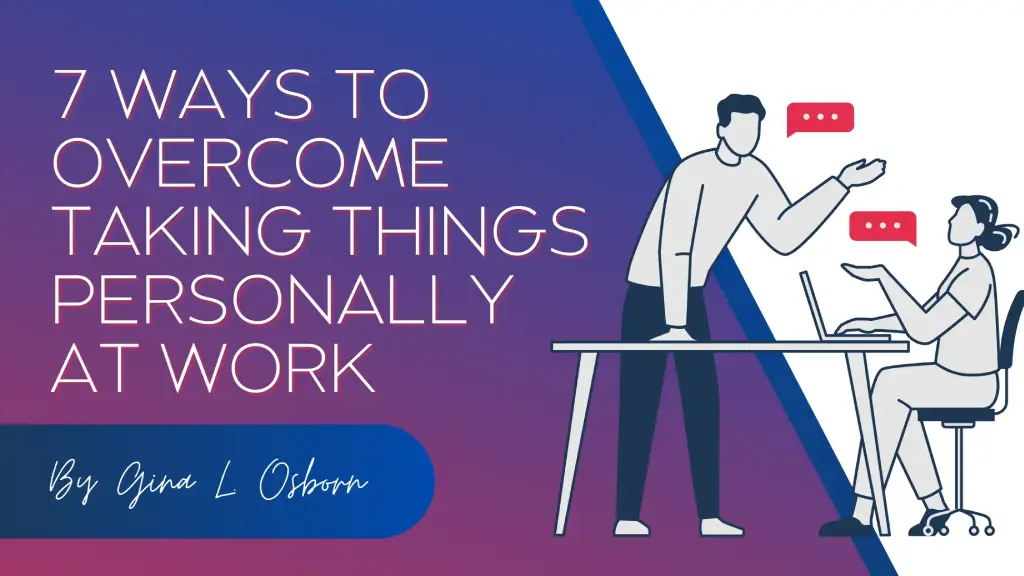Taking things personally is an easy trap to fall into, but it can be incredibly damaging to both personal growth and professional success. In The Four Agreements, Don Miguel Ruiz reminds us that nothing others say or do is because of us—it’s a reflection of their own experiences and reality. Letting others’ words define our self-worth slows us down, keeps us stuck, and distracts us from our goals.
I remember a moment early in my career when a senior colleague offhandedly dismissed an idea I’d worked on for weeks. My first instinct was to feel attacked, to question whether I was cut out for the job. But then I paused and reminded myself: it wasn’t about me. The dismissal was a reflection of their priorities and perspective—not a verdict on my abilities. That realization allowed me to step back, ask clarifying questions, and adjust my approach without letting the comment derail my confidence.
Here’s the truth: taking things personally is also a selfish act. Why? Because it makes everything about you, rather than focusing on the bigger picture. Think about it—would you prefer to work with a teammate who’s constantly derailed by offhanded comments, or would you rather work with someone who can be resilient and focus on the needs of the team? We need people who are mission-focused and undeterred by the noise that doesn’t matter.
Imagine someone says something offensive enough to throw you off your game. You have two choices: stew over it, call a friend to vent, disparage the person, and lose sleep—or, as I like to say, give them the finger. Not that finger! Instead, use the “come-hither” finger and calmly ask, “What did you mean by that?”
This simple question does two powerful things. First, it puts the other person on notice, signaling that their behavior isn’t acceptable. Second, it prevents you from wasting energy on hurt feelings or sleepless nights. Most importantly, it allows you to resolve the issue professionally and move forward without resentment.
By refusing to take things personally, you free yourself from the unnecessary emotional weight that slows you down. You remain focused on what truly matters—achieving your goals, staying mission-driven, and leading without boundaries. Resilience isn’t just about bouncing back from setbacks; it’s about refusing to let distractions hold you back in the first place.
So, how can we avoid, or better yet, overcome the distraction of taking things personally? Here are seven actionable strategies to help you stay focused, confident, and mission-driven. Time to do a little role-play!
- Reframe the Comment
Imagine your supervisor says, “This report lacks detail.” Instead of spiraling into self-doubt, reframe the comment as feedback, not a personal critique. A response like, “Thank you for the input—what specific details would you like me to add?” keeps you composed and demonstrates professionalism. - Understand the Bigger Picture
A colleague snaps at you during a meeting. Instead of internalizing it, consider their circumstances. Are they under pressure from deadlines? Did they misunderstand something? Recognizing that others’ reactions often have little to do with you can help you let go of unnecessary hurt. A quick follow-up like, “I noticed you seemed frustrated earlier—can I clarify anything for you?” can diffuse tension. - Focus on the Mission
During a project meeting, someone dismisses your idea with, “That’ll never work.” Instead of taking it personally, refocus on the mission. Reply with, “I’d love to hear your concerns—what specifically do you think might be a challenge?” Keeping the discussion about the idea and not yourself fosters constructive dialogue. - Practice Emotional Detachment
When receiving critical feedback, remind yourself: “This is about the work, not me.” If a presentation doesn’t go as planned and someone says, “That could’ve been stronger,” avoid personalizing it. Instead, think, “How can I strengthen it next time?” Detachment means viewing feedback objectively, not ignoring it. - Set Boundaries
Sometimes, taking things personally stems from unclear boundaries. If a coworker routinely interrupts or dismisses you, address it calmly: “I’d appreciate it if we could finish one idea before moving on.” Setting boundaries firmly but respectfully communicates that certain behaviors are unacceptable. - Reflect, Don’t React
Before responding to a perceived slight, pause and ask yourself: “Is this worth my energy?” More often than not, the answer is no. Save your emotional bandwidth for meaningful work and let minor offenses roll off your back. It’s important to figure out what hill you’re willing to die on. If you’re willing to die on every hill, you need to find a new war. - Take Ownership of Your Emotions
Ultimately, how you react is within your control. If someone’s comment triggers you, ask yourself why. Is it hitting an insecurity? If so, use it as an opportunity for growth rather than letting it hold you back.
By practicing these strategies, you can train yourself to let go of unnecessary emotional weight, focus on what truly matters, and lead with clarity and strength. Remember, your energy is precious—don’t waste it on distractions that don’t deserve it.
About Gina L. OsbornGina L. Osborn is a former FBI Assistant Special Agent in Charge, former Chief of Safety for LA Metro, and recognized expert in security, crisis management, and leadership. With extensive experience combating international terrorism, cybercrime, and violent crime, she is committed to helping organizations develop effective, proactive safety strategies and shares lessons on authentic leadership, leading through chaos, crisis, and change, and rising to the top in male-dominated fields. To learn more, visit www.ginalosborn.com.

